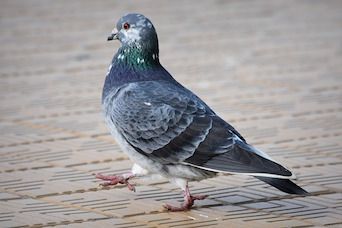Do Animals Make Use of Collective Intelligence?
In successive generations of homing pigeons, researchers observed that collective intelligence accumulates and leads to progressive modifications.

By analyzing flight routes of homing pigeons over time, researchers at the University of Oxford determined that collective intelligence accumulates in animal groups and leads to progressive modifications. Study results, recently published in Nature Communications, suggest that animals exhibit cumulative cultural evolution (CCE), a process allowing “groups to develop increasingly complex knowledge and skills over time, beyond the capacities of a single individual,” the researchers wrote.
Collective intelligence is used in groups to make joint decisions based on pooled information. It has been studied primarily during “one-off” tasks in human and animal groups, such as bees selecting a nesting site, with the assumption that group decisions are not based on the previous experiences of a particular task. However, because animals often repeat tasks in nature, it is thought that prior experiences do influence decision making—a concept called “collective learning.”
CCE has been studied extensively on its own and is thought be exclusive to humans. To date, little research has been done to explore the relationship between CCE and cumulative intelligence.
Study Design
Researchers studied the flight routes of 60 homing pigeons to evaluate collective intelligence for a repetitive, ecologically relevant task. Pigeons were selected because they demonstrate individual and collective information processing; also, naive pigeons follow the lead of experienced pigeons and provide input for improving flight routes.
Pigeons were equipped with GPS loggers and divided into 3 groups:
- Control solo pigeons
- Control paired pigeons (fixed pairings)
- Experimental (successive generational pairings)
In the experimental group, researchers created 10 chains of generations:
- Generation 1: Single bird
- Generation 2: Naive bird paired with first-generation (experienced) bird
- Generation 3: Experienced bird replaced with a new naive bird
- Generations 4 and 5: As for generation 3
Each paired experimental generation was released 12 times (60 total releases). Control groups were also released 60 times. All releases occurred from the same location. Researchers used the GPS logger data to analyze route efficiency and similarity.
Results
Route Efficiency
All groups improved their route efficiency. Efficiency plateaued by the 13th release for the control groups yet improved with each successive generation in the experimental group; within each generation, efficiency dropped initially when the naive bird was introduced, then improved with subsequent releases.
From the end of generation 1 to the end of generation 5 in the experimental group, route distance shortened by 0.75 miles. In stark contrast, route distance shortened by only about 0.03 miles in the control groups. Notably, route efficiency was significantly better at the ends of generation 4 and 5 in the experimental group than in either control group.
Results demonstrated the marked improvement in route efficiency with successive generations of birds compared with solo birds or fixed pairings.
Route Similarity
Route similarities were compared within and between the 10 chains of generations in the experimental group. From generations 1 to 3, routes were significantly more similar within chains than between chains, indicating a cross-generational transfer of knowledge. Starting at generation 4, though, within-chain and between-chain routes became largely similar, signifying decreased route variation across chains over time.
Conclusions
The researchers concluded that this study supported a conceptual link between CCE and collective intelligence. Such accumulated collective intelligence “demonstrates a more widespread potential for [CCE] than previously thought,” the researchers wrote. Importantly, the study’s findings demonstrated that CCE in animals does not necessarily rely on higher-level cognition, as it is believed to do in humans.
Dr. JoAnna Pendergrass received her Doctor of Veterinary Medicine degree from the Virginia-Maryland College of Veterinary Medicine. Following veterinary school, she completed a postdoctoral fellowship at Emory University’s Yerkes National Primate Research Center. Dr. Pendergrass is the founder and owner of JPen Communications, a medical communications company.